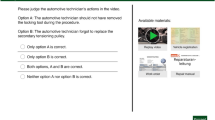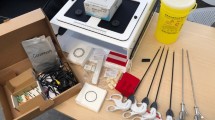Abstract
Introduction
Maintaining the existing FLS test centers requires considerable investment in human and financial resources. It can also be particularly challenging for those outside of North America to become certified due to the limited number of international test centers. Preliminary work suggests that it is possible to reliably score the FLS manual skills component remotely using low-cost videoconferencing technology. Significant work remains to ensure that testing procedures adhere to standards defined by SAGES for this approach to be considered equivalent to standard on-site testing.
Objective
To validate the integrity and validity of the FLS manual skills examination administered remotely in a real-world environment according to FLS testing protocols and to evaluate participants’ experience with the setting.
Methods
Individuals with various levels of training from the University of Toronto completed a pre- and a post-test questionnaire. Participants presented to one of the two FLS testing rooms available for the study, each connected via Skype to a separate room with a FLS proctor who administered and scored the test remotely (RP). An on-site proctor (OP) was present in the room as a control. An invigilator was also present in the testing room to follow directions from the RP and ensure the integrity of test materials.
Results
Twenty-one participants were recruited, and 20 completed the test. There was no significant difference between scores by RP and OP. Interrater reliability between the RP and OP was excellent. One critical error was missed by the RP, but this would not have affected the test outcome. Participants reported being highly satisfied.
Conclusion
We demonstrate that proctors located remotely can administer the FLS skills test in a secure and reliable fashion, with excellent interrater reliability compared to an on-site proctor. Remote proctoring of the FLS examination could become a strategy to increase certification rates while containing costs.

Similar content being viewed by others
References
FLS: Celebrating a decade of innovation in surgical education. http://www.flsprogram.org/wp-content/uploads/2014/11/14NOVBULL-FLS-final-author-proof.pdf. 2014 Nov Bulletin. Accessed on 06 April 2015
Fundamentals of Laparoscopic Surgery. http://www.flsprogram.org Accessed 01 April 2015
Rooney DM, Santos BF, Hungness ES (2012) Fundamentals of laparoscopic surgery (FLS) manual skills assessment: surgeon vs nonsurgeon raters. J Surg Educ 69(5):588
Fraser SA, Klassen DR, Feldman LS, Ghitulescu GA, Stanbridge D, Fried GM (2003) Evaluating laparoscopic skills: setting the pass/fail score for the MISTELS system. Surg Endosc 17(6):964–967
Okrainec A, Vassiliou M, Kapoor A, Pitzul K, Henao O, Kaneva P, Jackson T, Ritter EM (2013) Feasibility of remote administration of the fundamentals of laparoscopic surgery (FLS) skills test. Surg Endosc 27(11):4033–4037
Rooney DM, Brissman IC, Finks JF, Gauger PG (2015) Fundamentals of laparoscopic surgery manual test: is videotaped performance assessment an option? J Surg Educ. 72(1):90–95
Soper NJ, Fried GM (2008) The fundamentals of laparoscopic surgery: its time has come. Bull Am Coll Surg 93:30–32
Rudderow J, Bansal J, Wearne S, Lara-Torre E, Paget C, Ferrara J (2014) Development of a web-based laparoscopic technical skills assessment and testing instrument: a pilot study. J Surg Educ. 71(6):e73–e78
Okrainec A, Soper NJ, Swanstrom LL, Fried GM (2011) Trends and results of the first 5 years of fundamentals of laparoscopic surgery (FLS) certification testing. Surg Endosc 25(4):1192–1198
Okrainec A, Henao O, Azzie G (2010) Telesimulation: an effective method for teaching the fundamentals of laparoscopic surgery in resource-restricted countries. Surg Endosc 24(2):417–422
Peters JH, Fried GM, Swanstrom LL, Soper NJ, Sillin LF, Schirmer B, Hoffman K, SAGES FLS committee (2004) Development and validation of a comprehensive program of education and assessment of the basic fundamentals of laparoscopic surgery. Surgery 135(1):21–27
Ritter EM, Scott DJ (2007) Design of a proficiency-based skills training curriculum for the fundamentals of laparoscopic surgery. Surg Innov. 14(2):107–112
Apostolou C, Panieri E (2007) National survey of surgeons’ attitudes to laparoscopic surgical training in South Africa. S Afr J Surg 45(3):86, 88, 90–91
Fried GM, Feldman LS, Vassiliou MC, Fraser SA, Stanbridge D, Ghitulescu G, Andrew CG (2004) Proving the value of simulation in laparoscopic surgery. Ann Surg 240:518–525
Vassiliou M, Ghitulescu G, Feldman L, Stanbridge D, Leffondré K, Sigman HH, Fried GM (2006) The MISTELS program to measure technical skill in laparoscopic surgery: evidence for reliability. Surg Endosc 20:744–747
Scott DJ, Ritter EM, Tesfay ST, Pimentel EA, Nagji A, Fried GM (2008) Certification pass rate of 100% for fundamentals of laparoscopic surgery skills after proficiency-based training. Surg Endosc 22(8):1887–1893
SAGES. Webassessor Hardware and Software Requirements. http://www.flsprogram.org/wp-content/uploads/2014/05/Webassessor-computer-requirements-2014.pdf. Accessed on 07 April 2015
White MT, Drapiza M, Mattos MA, Edelman DA (2015) An automated system for video documentation of all instances of fundamentals of laparoscopic surgery training: feasibility and potential advantages of extended assessment. Am J Surg 209(1):158–162
Acknowledgments
We would like to thank Inga Brissman from SAGES as well as the staff at the Temerty/Chang telesimulation Centre and the Centre for Global eHealth Innovation for their help and support with this study.
Funding
This work was supported by the Center for Excellence in Surgical Education, Research and Training (CESERT) (Grant #12-01).
Author information
Authors and Affiliations
Corresponding author
Ethics declarations
Disclosures
Allan Okrainec is a consultant for Covidien and receives fellowship support from Covidien. Melina Vassiliou reports research and receives fellowship support from Covidien. M. Carolina Jimenez, Oscar Henao, Pepa Kaneva, and E. Matthew Ritter have no conflicts of interests or financial ties to disclose.
Rights and permissions
About this article
Cite this article
Okrainec, A., Vassiliou, M., Jimenez, M.C. et al. Remote FLS testing in the real world: ready for “prime time”. Surg Endosc 30, 2697–2702 (2016). https://doi.org/10.1007/s00464-015-4595-x
Received:
Accepted:
Published:
Issue Date:
DOI: https://doi.org/10.1007/s00464-015-4595-x




